Following its recent release on UK DVD from DNC and impending US release from Lions Gate, DEAD WOOD director David Bryant takes time out to chat to Stu Willis about the ups and downs of producing low budget independent horror movies in our exclusive spotlight interview.
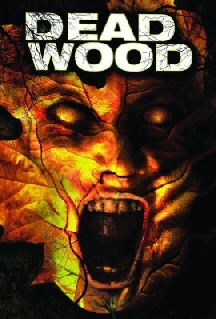
Stu: Firstly, congratulations on the film. Can you tell us how the film first came to be? What was the initial inspiration?
David :I had produced a short called 'dead wood' along with Menan Films partners Rich Stiles and Seb Smith which has got us some praise from competitions so we all decided it was time to make a feature. We all wanted to make a horror but had another screenplay, a ghost story in mind. We roughly sketched out a budget and realised we could spend years looking for funding, so we pretty much decided to write a script around what we had and what was free- like filming in the woods. I would say the film came about as much through necessity as inspiration.
Stu: I note the film was shot in Battle, East Sussex. Whereabouts precisely, and when was the film made?
David: We actually started shooting in 2003! We were still doing little reshoots etc in 2005 and completed in 2007� a long run, Kubrick would have been proud! It was shot all over the woods around Battle, whereever looked right. The scenes where they were swimming were shot in Frensham Pond, Surrey.
Stu: I'm guessing there were no permits - just shoot-and-run? Did this pose any particular problems?
David: Actually for most of the film we did have permission. We found a private woodland in Battle which the owner let us use day and night for a small payment- well worth it. This is where we shot 90 percent of the woodland scenes and where we found the hut, which they hired out for survival courses. It made the film possible as we'd be in certain locations for up to 18 hours shooting. There were places we shot without permission and sometimes you're lucky, most of the time you're not. It's pretty frustrating not finishing a scene before being asked to move on. Usually one of us would go and talk to the owner of the land while the other two would keep shooting, trying to complete the necessary shots.
Stu: You've spoken before of the film being a "real guerrilla affair". Further to the last question, can you elaborate on this?
David: During the shoot (with the exception of a day or two) there were just three of us working on the film. We drove the actors and equipment, unloaded, set up, directed, produced, lit the scenes, recorded sound- everything! We were out in the woods most of the time with no creature comforts- no toilets! This continued through postproduction with the three of us editing the film together, though of course we had Adam Langston, the composer working with us.
Stu: What budget are we talking about? And how was the finance raised?
David: We don't have an actual figure but at a rough guess I'd say from pre-production through to the completion of the film it was around �15,000. That is about two days catering budget on a UK so-called "low budget" film. There was no finance behind the film, the money was just whatever we had on us. We spent it as we needed to, mostly on snickers and red bull.
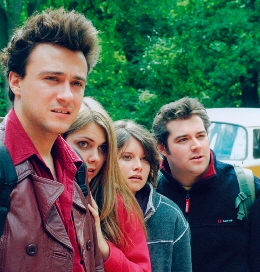
Stu: Tell us a little more about your cast? How did they become involved with the film, and how did they each approach it?
David: That's a long story but I'll give you the edited version. We originally had a different cast except for Fergus March (Webb). For various reasons- none of our doing- we lost 4 of our main cast within two weeks of shooting. Fergus then leapt into action- we replaced Milk with Fergus' flatmate John Samuel- Worsey, Emily Juniper (Fergus' then girlfriend) jumped in to the role of Larri, John introduced us to Nina (who had graduated drama school that day) and two days before heading off to shoot we cast Rebecca who was my first choice (I was out voted) at auditions. So basically we were casting up until 24 hours before we left for Battle.
We couldn't have asked for a better cast- the problems with recasting definitely worked in our favour as the whole cast clicked. There was a brilliant atmosphere while shooting, no strops, no sulking. They all loved the opportunity of starring in a feature, especially a horror movie. They approached the shoot with a sense of fun that undoubtedly leaked through into the film at moments and each brought a lot to their characters.
Stu: You co-wrote/directed and produced the film with Richard Stiles and Sebastian Smith. What are the benefits and drawbacks of working as a threesome?
David: There were a lot of benefits, the biggest simply being that three heads were better than one. The logistics of making something feature length both in terms of story and production are immense, far greater than we imagined, and having three of us gave us someone to bounce ideas off as well as three heads to plan and solve any issues that arose. It's an odd dynamic and can see how in most cases it wouldn't work but we had to leave our egos at home and we reached a place where we could call each other c**ts without any offence caused.
I guess the drawback is that the final film doesn't have your personal stamp on it. If I'd been directing alone it would've been different, some possibly better, some much worse, but when three of you direct (and do the camera work) it becomes hard to distinguish your voice from the others. Though I do think Dead Wood is much smoother than expected considering three people co-directed.
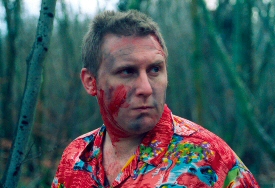
Stu: You also have a part in the film, as Rob. How did you find this experience?
David: We added the opening quite far into postproduction. We originally introduced the main characters in London scenes but we realised you just didn't need them. When these were cut we realised the film needed an exciting opening, not just for audiences but for distributors, who may only watch the first ten minutes, and if no horror happens in that time, you're fucked. I was cast simply because of the opening I had written. He would be falling, jumping etc. and didn't want to risk injuring an actor, so I stepped up. I'd been working as an extra (I'm one of the V's at the end of V for Vendetta!) and done a few lines on TV shows but I'm no thespian! Acting is not something I would pursue but it was fun doing a cameo, though I was really ill the day we shot my scene so it was pretty miserable hanging over the edge of the gully on a freezing cold day in a Hawaiian shirt.
Stu: Going back to the writing: the script is arranged so that it begins like countless other horror films, and then takes a neat detour into unexpected territory midway through. Was this an intentional ploy?
David :It was totally intentional. Our first thoughts on filming in the woods was whether we do a gory slasher but none of us wanted to make one. We thought the best idea was to set up a familiar premise then spin it into something totally different.
Stu: Can you talk us through the FX in the latter half a little? Obviously, we have to take care here with regards to possible "spoilers"! But, can you give some insight into how some of the effects were achieved on such a small budget?
David: All the compositing and grading was done by Rich Stiles. It was painstaking work that took up two years. The only digital effect is the Milk tree sequence which is pretty impressive and was created by Rob Ellis. The big finale fire sequence was something I wrote in postproduction. Our initial ending wasn't big enough in scale so I wrote this bigger burning the forest ending. I wasn't sure it would be possible to create, as CGI fire (at that time) usually looked awful, but Rich explained how he would do it: We shot the static plate shots on location, then Rich built half size models of the tree and actors. We then took them all to a waste ground at night, framed them up close to the original frame and burnt them. When the fire was composited over the actors it looked amazing. It was definitely worth being stopped by three police officers as we climbed over a fence to get out of the waste ground and searched under the terrorism act.
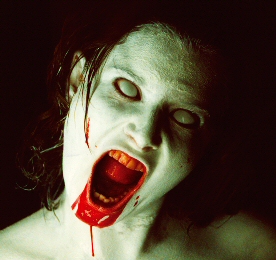
Stu: What have audience reactions to the film been like?
David: We've had a very positive reaction to the film. Even the more critical reviews comment that as filmmakers there is a future for us. We're realistic about the film, it's not a film that redefines horror, it is an 80 minute entertainment that is enjoyable and fun if you go along for the ride. I think we're as critical as anyone about the film - we definitely haven't peaked!
Stu: What's the one tip you'd give to anyone planning on making their own indie horror feature?
David: Just go out and do it! Don't sit around waiting for money or moan about problems, just work around them to get your film made. It more than likely won't be the movie you started out to make but it'll teach you all you need to know. With technology available now you can make a real movie without millions of dollars- but don't expect it to be finished in a few months, it takes time to get it right.
Stu: Can you enlighten us on the process of getting your film noticed and picked up for distribution by DNC. Did it play festivals? If not, what route did you take?
David: Dead Wood played at around a dozen festivals, all smaller horror festivals, and that was great. Our goal was for as many people as possible to see the film and at festivals they get to see it on the big screen. I travelled to the Salento FearFest in Southern Italy and it was incredible to see the film play in an old town square outdoors watched by all the locals, who loved it! The best advice in getting your film noticed is your website and trailer- you MUST make those two things stand out, be the best they can be. Seb created our website which pulled people in then the trailer we cut got them intrigued enough to want to see the movie. We got news out through movie news websites who featured the trailer and the amount of hits we got was incredible. From this we were contacted by lots of sales agents interested in seeing a screener of the film.
Stu: I see "Dead Wood" has won American distribution via Lions Gate (the DVD is due out on the 7th July 2009). How did this come about?
David: We were contacted after they read about the film on movie websites and we simply sent them a screener and they bought it for distribution. We were amazed, and very happy!
Stu: The Lions Gate DVD includes quite a few extras, whereas DNC's UK disc is bare. However, I understand you did make the extras available for the UK release. Why weren't they included? What are your feelings about this decision? I appreciate you may not want to comment on this matter, but the answer may be of interest to readers who don't normally get to see that side of distribution.
David :Once the film was with our sales agent it was out of our hands. We have no contact with the companies that buy the film through the sales agent but extra features are available to them. I believe DNC discs are vanilla (have no extra features). We were disappointed at the lack of features, especially that they didn't use the 5.1 mix available but it's up to them, it's no longer our film.
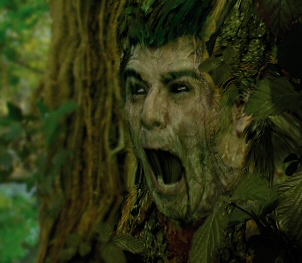
Stu: Based on your experiences of finding distribution for "Dead Wood", is there anything you'll do differently in future - or any advice you can offer would-be filmmakers regarding distribution?
David :I think we done that the right way. We created buzz that brought people to us. What we would do differently is work out paperwork, clearances etc. as we go, that is a real headache at the end!
Stu: "Dead Wood" is one of many, many UK horror films that have made an impression on both sides of the Atlantic during this decade. What's your take on the UK horror "boom"?
David :I think it took a long time for film companies to realise horror was a viable genre in the UK. I feel much of the UK industry is awards based, people making worthy films to win awards but as Hollywood shows us the majority of audiences want to be entertained. I'm glad the UK are now making films like The Decent and Shaun of the Dead, things that I would pay to see at the cinema- that's what I hope my future films will be equal to.
Stu: What horror films do you hold a personal torch for? Have any of them consciously influenced your own work?
David: The films of John Carpenter have been a huge influence on me, as with many other filmmakers, especially the Thing. I have fond memories of being scared shitless as a kid by Alien, Dawn of the Dead, Nightmare on Elm Street and the Omen movies and all have a certain influence through what they teach you about making a film.
Stu: I'm going to have to ask you the question I ask all of our interviewees: if Hollywood remade "Dead Wood" tomorrow, who would be your ideal cast? No, you're not allowed to choose the original cast members ...!
David :Larri- Jessica Alba (For pure acting talent); Webb- Chris Evans (For being his work in Sunshine) Jess- Jessica Biel (For even more acting talent); Milk- Shia Labeouf (For those classic comic moments); Ketsy- Megan Fox (You know why!); Rob- George Clooney! (Because he looks just like me!)
Not sure Hollywood will go for it� Though I'd be pre-ordering the DVD!
Stu: Finally, what's in the pipeline - any future projects that you're able to discuss? Are you continuing to work as a team with Sebastian and Richard?
David: As a trio we are developing Hunting Ground, a screenplay by horror novelist Paul Finch about a group of army cadets being hunted by SAS type soldiers who have been exposed to a bio weapon turning them into psychotic killers. It's totally action packed and very violent, the kind of film I love, a bit like Battle Royale and Rambo. We're taking that to Cannes and to LA to try to get the ball rolling. We also have two other screenplays in development, one a low budget UK horror that are both coming along and looking pretty cool.
Stu: Good luck for the future, and congratulations on the film - I hope it proves to be very successful for you.
David: Thank you for the interview�.
Special thanks to David and the Dead Wood team.